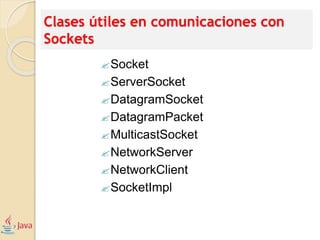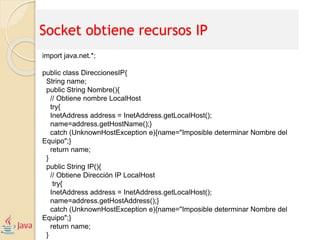NETWORKING EN JAVA CLASSES IN THE JDK...
- 1. Ing. Geovanny Vega VillacĂs, MTC
- 2. NETWORKING CLASSES IN THE JDK Through the classes in java.net, Java programs can use TCP or UDP to communicate over the Internet. – The InetAddress, URL, URLConnection. – Socket, and ServerSocket classes all use TCP to communicate over the network. – The DatagramPacket, DatagramSocket, and MulticastSocket classes are for use with UDP
- 3. Accessing TCP/IP from Java is straightforward. The main functionality is in the following classes: – java.net.InetAddress : Represents an IP address (either IPv4 or IPv6) and has methods for performing DNS lookup (next slide). – java.net.Socket : Represents a TCP socket. – java.net.ServerSocket : Represents a server socket which is capable of waiting for
- 4. INETADDRESS • The InetAddress class is used to encapsulate both the numerical IP address and the domain name for that address. • We interact with this class by using the name of an IP host, which is more convenient and understandable than its IP address. • The InetAddress class hides the number inside. Servers InteAddress have three main purposes:  Encapsulates an address  Performs name lookup (converting a host name into an IP address)  Performs reverse lookup (converting the address into a host name)
- 5. Factory Methods InetAddress • static InetAddress getLocalHost( ) throws UnknownHostException • static InetAddress getByName(String hostName) throws UnknownHostException • static InetAddress[ ] getAllByName(String hostName) throws UnknownHostException
- 6. Getter Methods ď‚— public boolean isMulticastAddress() ď‚— public String getHostName() ď‚— public byte[] getAddress() ď‚— public String getHostAddress()
- 7. Utility Methods ď‚— public int hashCode() ď‚— public boolean equals(Object o) ď‚— public String toString()
- 8. Clases útiles en comunicaciones con Sockets Socket ServerSocket DatagramSocket DatagramPacket MulticastSocket NetworkServer NetworkClient SocketImpl
- 9. Socket obtiene recursos IP import java.net.*; public class DireccionesIP{ String name; public String Nombre(){ // Obtiene nombre LocalHost try{ InetAddress address = InetAddress.getLocalHost(); name=address.getHostName();} catch (UnknownHostException e){name="Imposible determinar Nombre del Equipo";} return name; } public String IP(){ // Obtiene DirecciĂłn IP LocalHost try{ InetAddress address = InetAddress.getLocalHost(); name=address.getHostAddress();} catch (UnknownHostException e){name="Imposible determinar Nombre del Equipo";} return name; }

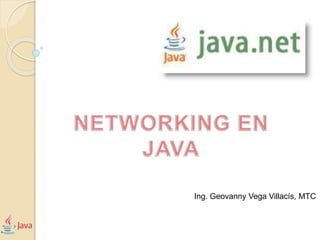
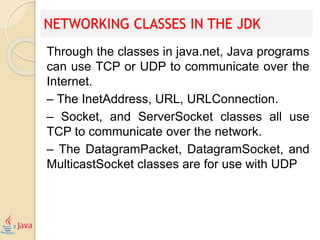

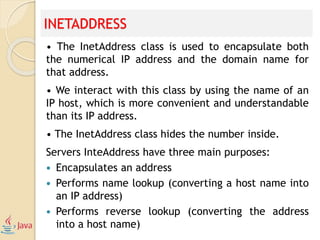
![Factory Methods InetAddress
• static InetAddress getLocalHost( ) throws
UnknownHostException
• static InetAddress getByName(String hostName)
throws UnknownHostException
• static InetAddress[ ] getAllByName(String hostName)
throws UnknownHostException](https://image.slidesharecdn.com/java-240613030726-63a19b18/85/NETWORKING-EN-JAVA-CLASSES-IN-THE-JDK-5-320.jpg)
![Getter Methods
ď‚— public boolean isMulticastAddress()
ď‚— public String getHostName()
ď‚— public byte[] getAddress()
ď‚— public String getHostAddress()](https://image.slidesharecdn.com/java-240613030726-63a19b18/85/NETWORKING-EN-JAVA-CLASSES-IN-THE-JDK-6-320.jpg)

